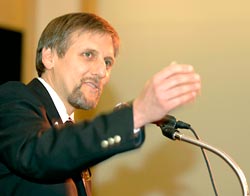
Corsi will give a lecture for the Energy, Environment and Society speaker series presented by the Schatz Energy Research Center on Thursday, Feb. 26, 5:30 p.m. in Founders Hall 118. The lecture is titled, Smog and Lemons: American Homes as Chemical Reactors and the Role of Energy Conservation in Reactor ‘Design’.
At UT-Austin Corsi is heading an indoor environmental program that is changing the face of indoor air quality research around the globe. “We have about 20 graduate students who are doing cutting edge research, taking up to eight courses related to the topic, mentoring undergraduate students, engaging in public outreach projects, and winning a lot of national and international awards.”
In the early 1990s Corsi began advising a graduate student on her indoor air quality research. He realized how much more was known about outdoor air quality than indoor and became quite disturbed when he discovered that the average American spends almost 20 times more indoors than outdoors. “I was intrigued by the number of questions that we raised that had never been addressed by anyone and that seemed so important,” said Corsi.
In his lecture Corsi will discuss how American homes have evolved over the past 60 years, “for better or for worse,” illustrating how new products create a wide-range of chemical reactions with disconcerting by-products.
Not being a doom and gloom kind of guy, Dr. Corsi “will offer some potentially effective ways of dealing with the problem—hopefully practical enough to allow people to act immediately.”
He will also provide copies of his quick list of a few dozen things people can do to improve the indoor air quality in their own homes.
This lecture will be an exciting opportunity to learn about a once neglected and now up-and-coming area of research that directly affects all of our lives.
For more information on the Energy, Environment and Society speaker series visit the Schatz Energy Research Laboratory